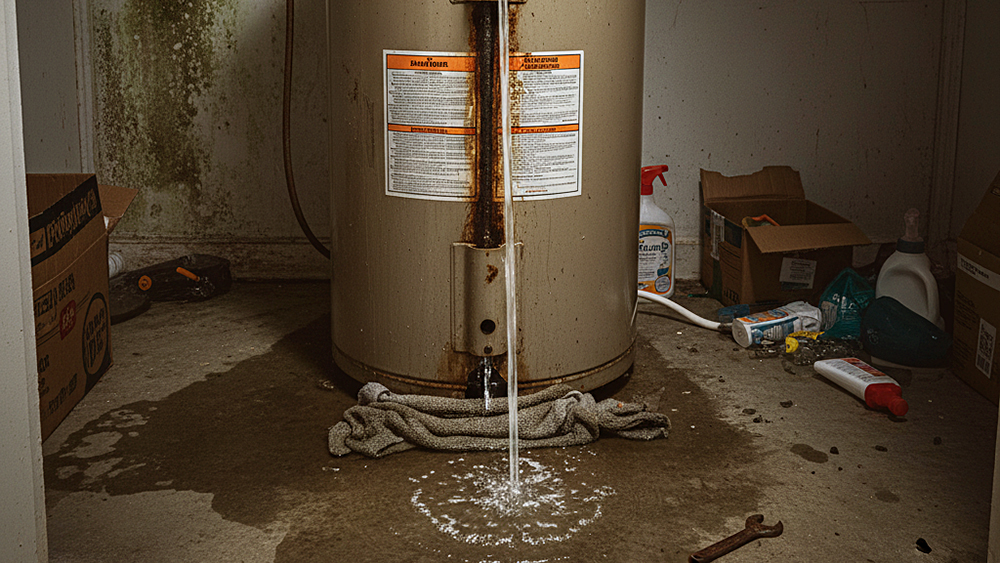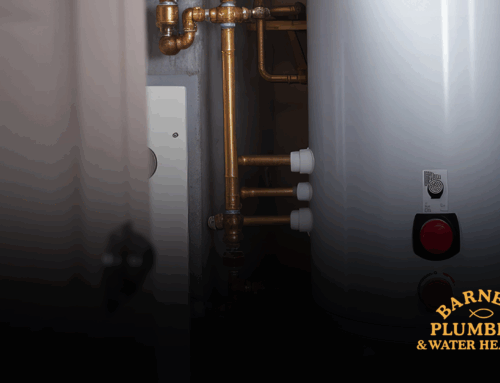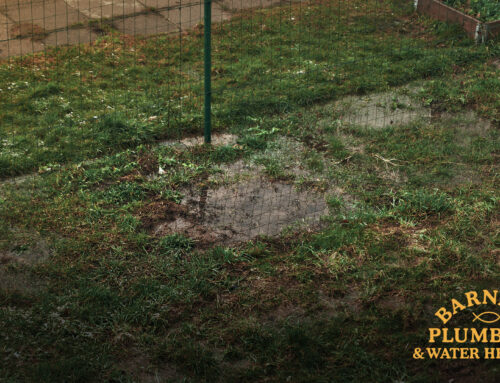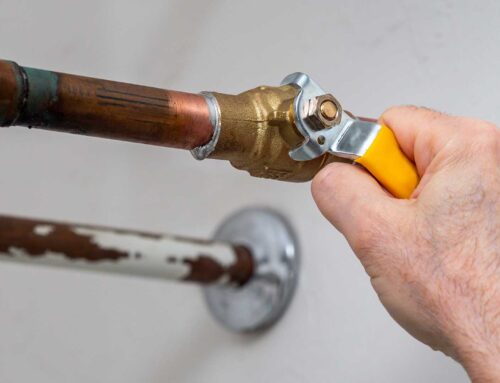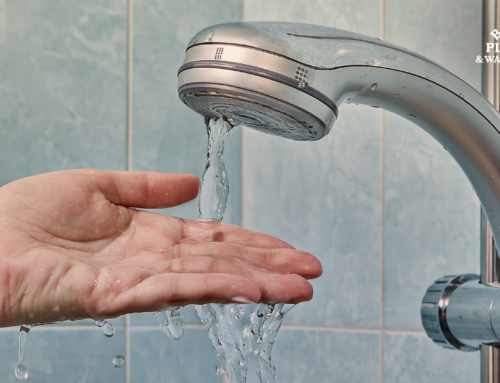You walk out to the garage and step into an unexpected puddle. Your eyes follow the stream of water to the source—your water heater. No homeowner wants to find their water heater leaking right before they jet off to work. Your mind instantly floods with questions about potential damage, costs, and safety.
If you’ve got a water heater leak on your hands, take a deep breath. This guide will help you deal with the leak quickly so you can get back to your jam-packed schedule.
What to Do Immediately
Your first priority is to prevent further damage and keep people and property safe. As soon as you notice water leaking from your water heater, follow these 4 steps:
Step 1: Turn Off the Power Supply
Safety comes first. Cut the power to the unit to prevent any additional hazards.
- For an electric water heater: Go to your home’s breaker box and flip the switch that controls the water heater. It should be clearly labeled. If you’re unsure which one it is, you can turn off the main breaker to be safe.
- For a gas water heater: You’ll need to find your gas shut off valve. Look for a dial or switch on the gas control valve. It should be on the front of the unit near the bottom. Turn it to the “OFF” position.
If there happens to be a gas leak, you’ll likely smell the odor. If you do smell gas, leave your home immediately and call your gas company.
Step 2: Shut Off the Water Supply
Even if it’s just a small leak, you need to stop more water from entering the tank. To shut off your water heater’s water supply:
- Look for the cold water inlet pipe, which is typically located at the top of your water heater. There may be a shut-off valve on this pipe. It will likely be either a handle you turn or a lever you pull. Turn the valve clockwise, or pull the lever, until it stops.
- If your water heater doesn’t have a shutoff, turn off your home’s main water supply. It’s better to leave your home without water for a few hours than to let a leaky water heater cause property damage all day long.
Step 3: Drain the Tank (If Necessary)
If you can see exactly where the water is leaking out of your water heater, you may be able to put a basin or bucket underneath the leak to catch the drips. However, especially if there is a lot of water leaking, draining the tank may be the best course of action. This will prevent further water damage to your floors, walls, and belongings.
To drain your water heater:
- Attach a standard garden hose to the drain valve located at the bottom of the water heater.
- Run the other end of the hose to a floor drain, a sump pump, or outside your home. Make sure the end of the hose is lower than the tank itself so gravity can help draw the water out of the tank.
- Open the drain valve and a hot water tap somewhere in your house to allow air into the tank. This will help it drain faster.
- Once no water is coming out of the hose, you can turn off the valves and remove the hose. Be careful when touching the hose because it will likely be hot.
Step 4: Call a Professional Plumber
Thanks to steps 1-3, you can now go about your day without stressing about the water leaking all over your home or garage. But, you probably don’t want to come home to no hot water, either. So, pick up the phone and call Barnett Plumbing at (925) 294-0171. We will take the water heater emergency from there so that you can go about your day in peace.
Why is My Water Heater Leaking?
If you’ve got a professional on the way, you don’t really need to do any additional investigating. We will find the source of the problem and let you know the best course of action to stop the leak. However, if you really want to put on your Sherlock Holmes hat, the rest of this guide will help you figure out what is causing the leak and what you can do about it.
Ultimately, leaks can originate from two main sections of the unit:
Hot Water Heater Leaking from the Top
If you notice water coming from the top of your unit, it could be caused by:
- Loose Pipe Fittings: The cold water inlet and hot water outlet pipes can loosen over time. Loose connections cause leaks and drips. Generally, this is due to corrosion. If you have an old water heater or live in an area with hard water, corrosion is a likely culprit.
- Temperature & Pressure (T&P) Relief Valve Issues: The pressure relief valve is a critical safety feature that releases pressure if it gets too high inside the tank. If the T&P valve is leaking, that could mean that the valve itself is faulty or that your tank has excessive pressure. This issue requires immediate professional attention.
- Anode Rod Connection: The anode rod helps prevent corrosion inside your tank by drawing corrosive materials to itself. If the connection point is leaking, your anode rod might need to be tightened or replaced.
Hot Water Heater Leaking from the Bottom
Hot water leaking from the bottom of the tank is often a more serious issue. While the leak could be from the drain valve, it’s usually a sign of a bigger issue. Leaks at the bottom of your water heater can quickly lead to floor damage so you will want to get the leak looked at right away. Here are some common causes:
- Internal Tank Corrosion: This is the most common reason for a leak at the base of a water heater. Sediment buildup corrodes the inside of your water heater tank. Most water heaters have a lifespan of 8-10 years. Once the tank is compromised, there is no way to patch or repair it. The entire unit must be replaced. Luckily, our process here at Barnett Plumbing & Water Heaters is designed to get you fast, stress-free service for your water heater emergencies. We can replace your tank without asking you to rearrange your whole schedule.
- Cracks in the Tank: If the tank itself has cracks due to age, wear, or manufacturing defects, it will leak. This is another issue that means the water heater needs to be replaced.
- Faulty Drain Valve: The drain valve itself can fail or come loose, causing a leak. This is a less severe problem that can sometimes be fixed by tightening or replacing the valve.
Other Reasons Why Water Heaters Leak
If your water heater isn’t leaking at the top or bottom of the unit, the cause may be one of these two things:
- Water Supply Line Issues: Sometimes water supply lines leak because they are worn out or have damaged pipes, fittings, or valves. These leaks can usually be repaired without replacing the entire unit.
- Improper Installation: This is one of the many reasons why we don’t recommend DIY water heater installation. If the unit wasn’t installed correctly, it may develop leaks at the connections or fittings. DIY installation also invalidates some water heater warranties. Be sure to weigh the pros and cons before you try to save a few bucks and install your own water heater.
To Repair or Replace? How to Make the Right Choice
The easiest way to decide if you should repair or replace your unit is to consult with a professional plumber. Their advice will likely depend on where the leak is coming from, how old your unit is, and how much the repair will cost.
- Repair: For minor issues like a leaking drain valve, a faulty T&P valve, or loose pipe connections, repairs are often worth the investment.
- Replace: If the tank itself is leaking, replacement is your only option. It also depends on the age of your unit. Since water heaters have a lifespan of 8–10 years, it may be more cost-effective to replace your aging unit with a new water heater. New units are often more energy efficient, making them a smart proactive investment.
How to Prevent Water Heater Leaks
There are two main ways you can prevent water heater leaks from sneaking up on you:
- Install a water heater leak detector. These devices can catch leaks early and help you prevent further damage to your home.
- Do preventative water heater maintenance. Did you know that your water heater should be flushed yearly? This helps prevent sediment buildup and extends the lifespan of your water heater.
Don’t Stress About Water Heater Leaks
Yes, a leaking water heater is often an urgent problem that needs to be dealt with ASAP. However, water heater issues don’t have to ruin your whole day.
The team at Barnett Plumbing & Water Heaters has been serving the Tri-Valley area for years. We are known for providing fast, friendly, and honest service. If you are dealing with a water heater emergency, give us a call at (925) 294-0171. We will quickly diagnose the source of your water heater leak and outline the best options to get it fixed.
Don’t let a small drip turn into a disaster. Contact us today for a free estimate and let our experts take care of your leaking water heater while you continue with your busy day.
Frequently Asked Questions About Water Heater Leaks
If you’re dealing with persistent low water pressure, contact Barnett Plumbing & Water Heaters to identify the issue and recommend the right solutions. We will never sell you a product or service you don’t want or need. With us, you can trust that you’ll get professional guidance without any pressure.

